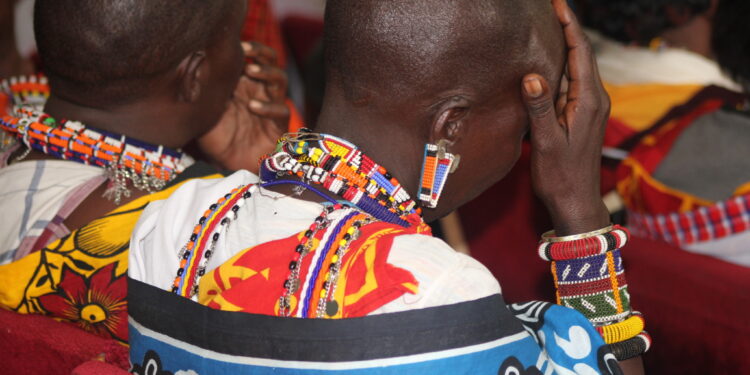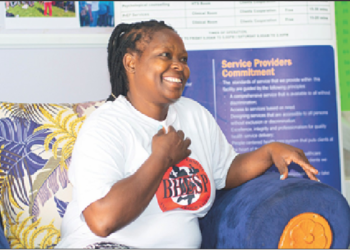Nasieku (not her real name but a name used to protect her privacy and safety) remembers the pain, trauma and humiliation she felt when she underwent female genital mutilation (FGM) at the age of 13 in 1995.
In the Narok region of Kenya, where Nasieku grew up, the ritual— the cutting or removal of part or all of the clitoris, labia, and vulva—has been performed on generations of girls in the Maasai community. While it confers no health benefits, FGM often results in health problems and can be fatal.
“When I was 13 years, my parents organized the FGM ceremony without my knowledge. My elder sister who knew about it whispered to me and advised me to run away, but I was too slow, and my mother knew about my plan to escape and convinced me that, as a woman, I had to undergo the cut because it is a good thing,” said Nasieku. “I respected and believed her, and I thought she was denying me something good because she had undergone FGM herself, so I gave in.”
By the age of 17 Nasieku was already married with a child.
“Childbirth was traumatic. I wouldn’t wish my worst enemy the kind of pain I felt. When giving birth, it was so painful because I bled a lot.”
Nasieku was inspired by her experience to start a campaign in her village to protect girls from being coerced or forced to undergo FGM. She even managed to convince her husband to support her initiative and six years ago began opening their home to those escaping the cut and to their children. She rescued numerous girls, providing them with a safe haven while space in a rescue center or safe house became available
Ms Pareiyo, the Director and founder of the Tasaru Ntomonok initiative that rescues young girls from FGM and early marriages
However, since then things at home have not been easy. During the buildup to the 2017 Kenyan general election, Nasieku’s husband decided to run for office as a member of the county assembly. Friends, family, and community leaders responded bluntly, warning that Nasieku’s campaign against FGM would prevent him from winning a seat. According to Nasieku, this placed a huge strain on their marriage.
“My husband requested that I slow down my work against FGM until the end of the political season because of the negative effect on his campaign. I stopped going for training and reporting cases of suspected FGM activities when things got heated,” she said but added that her campaign against FGM wouldn’t stop until she saw that her community had abandoned the practice.
Agnes Pareiyo, another Kenyan woman fighting FGM, said that when she was just 14, she met girls in her high school who came from communities that didn’t circumcize girls and that that is when she learned that one can grow up without undergoing the cut.
“This is all I wanted,” she said.
When schools closed she went back home and explained to her parents that she didn’t want to undergo FGM. Only her father sided with her. “My mother was so disappointed that I could even think of such a thing, but to my surprise my dad said it was okay if that’s what I felt since it was not necessary,” said Agnes.
“My mother said, “This is how things are like. This is our culture, this is our way. If you are not cut, who will you be? Would we call you a girl or a woman? Do you want to remain a child all your life? Who will marry you? How can we accept you into the adult rituals if you remain merely a child?”
Unfortunately, Agnes’s peers were far from sympathetic as well. They told her she would be cowardly for evading the cut. Pressured by so many close to her, Agnes gave in.
In 1999, after campaigning against FGM with a women’s organization in Kenya called “Maendeleo ya Wanawake” (Swahili for “women’s movement”), Agnes started the “Tasaru Ntomonok Initiative,” a Narok-based organization that works to eradicate FGM (and early childhood marriage). TNI operates a rescue center for girls who’ve fled their homes from fear of FGM or forced marriage. But soon after arrival, the girls have to be taken to the government’s Children’s Welfare and Protection office to undergo an investigation to confirm that their cases are genuine before they can be cleared to stay at the center. The organization also runs the Eskenlei Girls Boarding School, where rescued girls are enrolled. The school, which is open to the local community as well, has 82 girls.
This year, Agnes vied to become a member of parliament in Narok but lost during the nominations.
“I wanted to go to parliament and push for laws that could help curb the harmful culture like FGM,” she said. “There is a law against FGM in Kenya already,” Agnes explained. “But it is hard to enforce because the local government lacks advocacy on it.”
Agnes becomes encouraged that her activism will succeed when she sees more and more girls shunning FGM and early marriage and proclaiming that they want careers.
“It is slow, yet progressive,” she said.
“If we bring up such girls, we can fight. It will take years and years, but we can fight this battle and win even if we have to do it one girl at a time.”
In Kenya, 11 percent of girls have been circumcized according to the 2014 national survey, and nearly 23 percent of women aged 20-24 are married before reaching 18. One quarter of Kenyan women give birth by the age of 18.
In the remote Maasailand region of the country, female genital mutilation is epidemic. Only one in 100 are believed to avoid it, cast out from their communities if they’re not cut.
Flavia Mwangovya knows these statistics all too well. Manager of the “End Harmful Practices” program at the NGO Equality Now, she believes FGM is so deeply entrenched in some communities that it alone defines these areas’ politics. “This is even the case in several countries across the continent where FGM is practiced,” Ms. Mwangovya said. “It is, however, incumbent upon each one of us, starting at the family level, to continuously seek to change norms and attitudes toward this practice and to highlight the dire consequences of FGM and the importance of health and education.”
Note from the editor: Since this story was reported, the campaign to end FGM did notch a temporary win in Liberia. On January 21, 2018, less than a day before her term as president was to end, former Liberian President Ellen Johnson Sirleaf issued an executive order banning FGM. Because the order is an executive order and not a law passed by the nation’s parliament, it will expire after one year. But it is significant progress nonetheless.
This story was supported by the International Women Media Foundation (IWMF).
















